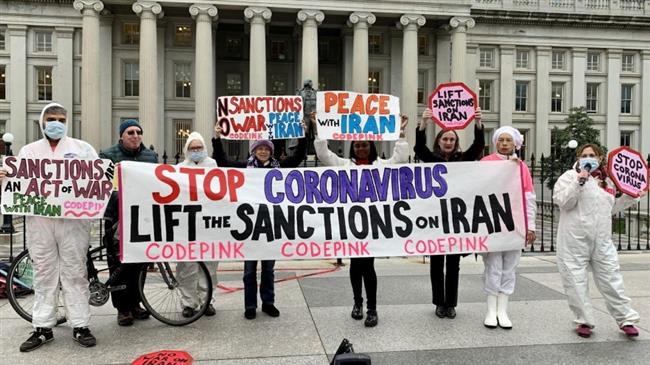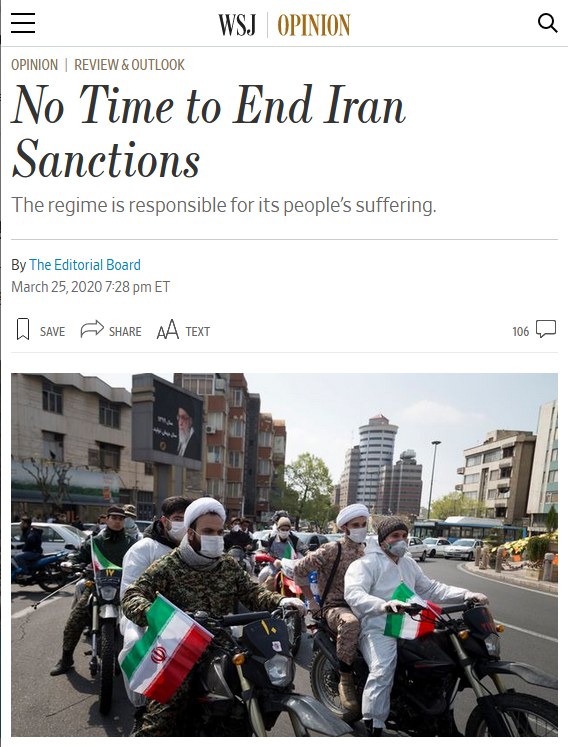
File photo of American demonstrators protesting Trump administrationís anti-Iran sanctions despite the coronavirus pandemic near the White House in Washington, DC.
By Gregory Shupak*
Covid-19 has hammered few countries as hard as it has hit Iran, which reports (as of April 8) 64,586 cases and 3,993 deaths. US sanctions are a major reason that Iranians are getting infected with and dying from the coronavirus in such large numbers: The USís economic warfare softened Iran up for the pandemic well before its outbreak.
Human Rights Watch documented last year (10/29/19) that sanctions had "drastically constrained the ability of [Iran] to finance humanitarian imports, including medicines, causing serious hardships for ordinary Iranians and threatening their right to health." US sanctions are specifically designed to immiserate Iran, and driving the country into poverty has left it ill-equipped to deal with the coronavirus emergency: Before the pandemic, sanctions had already cost Iran about $200 billion in revenue, primarily from decimated oil sales, and devalued the currency by half in the past two years (New York Times, 4/1/20).
As the scholar Eskandar Sadeghi-Boroujerdi (Jadaliyya, 12/3/19) noted in December, the sanctions constitute "the collective punishment of over 81 million Iranians through and by means of one of the most comprehensive and unrelenting sanctions regimes in modern history."
They are an effective economic blockade dragooning the energy sector, banking and finance (including its central bank), foreign investment and foreign exchange reserves and targeting basic foodstuffs, lifesaving medicines and much else besides. The war is near total and unremitting, and it has already taken many lives.
Americaís economic blitzkrieg extends to trying to dictate whether and how other countries engage with Iran. Last June, US special representative for Iran Brian Hook told European companies that they "have a choice: Do business with the United States or do business with Iran" (Washington Post, 6/28/19). In January, days before Europeans warned Iran of nuclear deal violations and instituted a dispute resolution mechanism established in the 2015 nuclear deal, President Trump secretly threatened to impose 25% tariff on European autos if Europe start the dispute resolution process; the US views this mechanism as a critical part of sanctioning Iran (Washington Post, 1/15/20).
Since Covid-19 has been tearing through Iran, the US state has not eased up its assault, "leaving Iran racing to curb the rapid, deadly spread of the new coronavirus, but these efforts are complicated by tight economic restrictions imposed by the United States" (Newsweek, 2/24/20). In fact, the US has escalated its aggression during the pandemic by adding further sanctions, "keeping up its economic pressure campaign" (Reuters, 3/17/20) against a country where people are dying by the thousands-one every ten minutes, according to the Iranian health ministry-in significant measure because of that pressure campaign.
The Trump administration claims that sanctions exempt the sale of medicine and medical devices, allowing Iran to access humanitarian aid, but as the New York Times (4/1/20) has acknowledged, "American secondary sanctions on financial institutions and companies that do business with Iran have made it nearly impossible for Iran to buy items like ventilators to treat coronavirus patients."
Human Rights Watch (10/29/19) has noted that the sanctions scare companies and banks out of doing business with Iran, and that as a result, Iraniansí access to essential medicine and their right to health is being negatively impacted, and may well worsen if the situation remains unchanged, thereby threatening the health of millions of Iranians.
Now the US is blocking Iranís request for a $5 billion IMF loan to fight coronavirus (Wall Street Journal, 4/7/20). Iranian "officials have a long history of diverting funds allocated for humanitarian goods into their own pockets and to their terrorist proxies," the Journal quoted an anonymous Trump administration official in the third paragraph, as though this were a trustworthy source.
Because the US government is directly responsible for Iranian deaths, Washingtonís role should be a central concern to US media. Yet thatís not the case, according to my examination of stories published between the emergence of Covid-19 in late December and April 2. The Washington Post published 386 articles that address Iran and coronavirus during that period, and 55 contained the word "sanctions." In other words, 85% of the paperís Iran-related Covid-19 coverage neglected to note that the government based in the city with which the publication shares its name has played an important part in the diseaseís destruction in Iran.
The New York Times ran 439 stories that mentioned Iran and the coronavirus, and 40 of them, a mere 9%, referred to the sanctions. One of these was an editorial (3/25/20) calling for the blockade on Iran to be lifted, but this article accepted and amplified the premises that are used to try to justify the sanctions:
Ideally, [lifting the US sanctions] could lead to a lowering of tensions, a reduction of attacks on American targets in Iraq by Iranian allies, and even, down the line, serious discussions on freezing Iranís nuclear escalation.
Thatís a lot of maybes, given a nation that has shown no inclination to back down before the United States. But if Iran refused American help or continued in its ways despite it, the sanctions would go back into place and the Islamist leaders would be hard put to convince their people that the United States was blocking humanitarian aid.
What the paper called "Iranís nuclear escalation" is a reference to Iran saying that it was no longer bound by a 2015 agreement that effectively ceased to exist when Trump scrapped it almost two years ago. Iran says that its nuclear program is purely for civilian purposes, and diplomats (AFP, 3/9/20) have reportedly said that none of [Iranís] current stockpile is enriched beyond 4.5%, with much of it at a lower level than that. It would need to be enriched to roughly 90% for use in a bomb, not to mention all the other work required to produce a weapon.
The United States, meanwhile, has just under 6,200 nuclear warheads, an arsenal that the New York Times evidently does not regard as dangerous.
Note also that demands are only made of Iran: The Iraqi forces allied with Iran have to stop their attacks on American troops that are in the country against the wishes of Iraqís parliament, but the US doesnít have to cease its attacks on them, let alone leave the country. Evidently, US forces in Iraq against the countryís democratic will should face no consequences for their violence, but Iran should be subject to economic throttling when its allies in the Iraqi military try to drive the US out.
In uncritically parroting the extremely dubious rationale for sanctions, The Times adopts a peculiar method of arguing against them.

Of 343 stories in the Wall Street Journal that cover the coronavirus and Iran, 65 include the term "sanctions," just 19%. An editorial (3/25/20) in the paper said the sanctions should continue, using the same talking points as the Times about Iraq and about Iranís nuclear program, though the Journal goes even further and suggests that Iran is involved in "nuclear weapons development." (The International Atomic Energy Agencyís March 3 Iran report says nothing to suggest that Iran is pursuing nuclear weapons.)
Furthermore, the Journal wrote that American restrictions on Iranian economic activity include an exception for food and medicine imports. Itís true that in the past banks were still hesitant to allow such transactions, but the US and Switzerland created a clearer channel for financiers to provide the country with help last month.
However, the Swiss payment system is "hardly a substitute for US sanctions relief (Newsweek, 2/24/20). It can only, as Human Rights Watch noted, "mitigate the harm United States sanctions pose to Iraniansí right to health." It remains necessary, the groupís deputy Middle East director said, "to monitor the negative impact of US sanctions on human rights, and to take steps for a remedy."
Bloombergís Eli Lake (3/22/20) also tried to conceal that heís sadistically calling for the US to keep collectively punishing Iran-a war crime, as it happens-during a global pandemic by invoking the Swiss channel, writing that
The US has tried to make it easier for Iran to purchase or trade for medicine and hospital equipment since the pandemic started. Last month, the US and Swiss governments established a humanitarian aid channel to make it easier for banks and financial institutions to underwrite such transactions with Iran.
Yet, as sanctions lawyer and political commentator Tyler Cullis (Responsible Statecraft, 2/20/20) noted, the Swiss payment approach seems to make it harder for Iran to access humanitarian items:
The so-called "humanitarian mechanism"-which was borne out of a desire to placate public concern over the effects of US sanctions on the Iranian people-sought to institute a system whereby foreign banks could receive written assurance from the US government that they would not be sanctioned for facilitating trade in humanitarian goods on the condition that they conduct enhanced due diligence with respect to Iranian counter-parties and submit routine reports to the US government regarding any transactions conducted....
Not surprisingly, the mechanism has been an utter failure.... The Trump administration set up a "humanitarian channel" that is not just too limited in scope to have meaningful impact on Iranís ability to access basic humanitarian goods, but that threatens to push out those few remaining banks that continue to facilitate trade in humanitarian goods with Iran. The reason is obvious: If the US government provides written assurance to certain banks that they will not be sanctioned for engaging in non-sanctionable trade with Iran, then other banks will be reluctant to facilitate such trade absent the written assurance. But, because such written assurance is barred for many foreign banks due to data-sharing laws in their local jurisdictions and because such written assurance appears to have only been provided to Swiss bank(s) at this time, those foreign banks that have facilitated trade in humanitarian goods with Iran up until this point are inclined to bow out due to the increased risks brought about by the humanitarian mechanism.
The best way to comprehensively remedy the inordinate harm the Iran sanctions do, it seems, would be to lift the sanctions, but few in the corporate media are making this rather obvious point.
*Gregory Shupak teaches media studies at the University of Guelph-Humber in Toronto. His book, The Wrong Story: Palestine, Israel and the Media, is published by OR Books.
(The views expressed in this article do not necessarily reflect those of Press TV.)
(Source: Common Dreams)
LINK: https://www.ansarpress.com/english/15725
TAGS:






























 online news tv
online news tv




